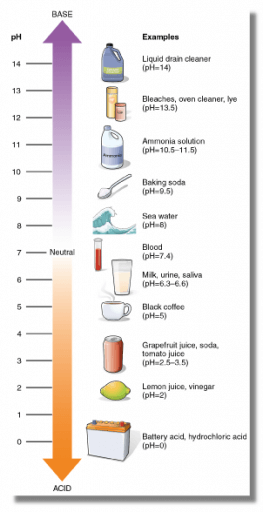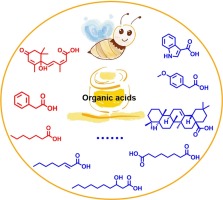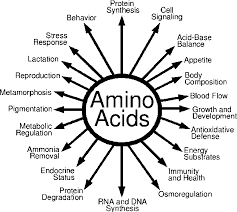One may be forgiven for assuming honey is just a sweet, syrupy snack. It’s actually packed with many health-promoting properties.
Honey offers a hearty helping of vitamins, minerals, antioxidants, and – what we’ll focus on here — acids (including amino acids).
Bees need these acids for their own nutrition, and to feed their developing larvae. When you harvest the honey from your own beekeeping operation, you reap those nutritional benefits for yourself and your family in turn.
Some of the key points we’ll hit on here include:
- The acidity of honey
- Organic acids contained in honey
- The amino acid content in honey
- The health benefits of optimal amino acid intake
- Why honey is actually alkaline-forming once ingested
- How to contact Dadant & Sons to learn more about the nutritional content of honey (as well as all things beekeeping)
How Acidic Is Honey?
The acids contained in honey (which we’ll explore more below) make it relatively acidic (probably more so than you might guess):
“Honey contains a number of acids which include amino acids (0.05-0.1%) and organic acids (0.57%, range: 0.17-1.17%). The average pH of honey is 3.9 (with a typical range of 3.4 to 6.1).”
For reference, the pH scale runs from 0-14. A pH is 7, in the middle of the scale, is considered neutral (neither acidic nor basic).
For comparison, honey is generally slightly more acidic than coffee (4.85 to 5.10) and tomato juice (4.05-4.65).
Despite its relatively low pH score, honey actually “softens” the sour taste of other acidic food products like lemon juice – one of the many reasons for its culinary popularity.
Honey’s acidity will increase (and its pH score will decrease) over time as the acids inside the honey age and it begins the fermentation process:
“The high microorganism count can increase the acidity in honeys. Osmophilic yeasts ferment honey by acting on the glucose and fructose, forming alcohol and carbon dioxide. Alcohol, in the presence of oxygen, can be broken down into acetic acid and water, which makes the fermented honey more acidic.”
Fermentation is the same process by which homemade wine often turns into vinegar.
If you so desire, you can prevent the fermentation and consequent acidification of your honey by pasteurizing it.* This process works by killing the bacteria inside the honey that feed on its sugars. To effectively pasteurize your honey, heat it to 160°F and then rapidly cool it.
*Please note that pasteurizing honey, while preventing acidification, can also affect the smell and taste.
Organic Acids Contained in Honey
Organic acids occur widely in nature, including in honey. They are considered “weak acids” because they tend to not dissolve in water.
The organic acids contained in honey include:
- Gluconic acid (the most prevalent acid in honey)
- Pyroglutamic acid
- Aromatic acids
- Acetic acid (documented to be useful for promoting weight loss, improving insulin sensitivity, and controlling blood sugar spikes. This is one of the many reasons that, despite its high sugar content, medical professionals recommend honey in moderation to diabetics.)
- Butanoic acid
- Formic acid
- Citric acid
- Succinic acid
- Lactic acid (which offers multiple well-documented health benefits such as limiting intestinal infections, controlling cholesterol levels, and potentially preventing cancer growth)
- Malic acid (which exerts heart-protecting effects)
Amino Acid Content in Honey
Amino acids are vital to human health because they are the building blocks of protein. That means your body utilizes them as the base materials to synthesize muscles, hormones, and neurotransmitters, among other things.
The dozens of amino acids contained in honey include:
- Proline (the most abundant amino acid in honey)
- Phenylalanine (essential amino acid*)
- Tyrosine (conditionally essential amino acid*)
- Glycine (conditionally essential amino acid*)
- Butyric acid
- Asparagine
- Ornithine (conditionally essential amino acid*)
- Lysine (essential amino acid*)
- Aspartic acid
- Cysteine (conditionally essential amino acid*)
- Isoleucine (essential amino acid*)
- Leucine (essential amino acid*)
- Arginine (conditionally essential amino acid*)
- Glutamic acid
- Histidine (essential amino acid*)
- Valine (essential amino acid*)
*The Critical Importance of ‘Essential’ Amino Acids
“Essential” amino acids refer to those that the human body cannot produce on its own. Accordingly, they must be sourced through diet or supplementation.
“Conditional amino acids” are amino acid compounds that the body can normally produce in adequate quantity but that can become depleted due to health conditions such as absorption issues in the gut or intense stress.
If you consume too few of the essential amino acids, of which many are plentiful in honey, a number of negative health consequences ensue.
The most abundant sources of essential amino acids in the human diet are animal products – most typically in meat and eggs. However, since vegetarians do not consume these meat products, their diets are often lacking in sufficient amino acid intake. Therefore, honey represents an ideal meat-free alternative source of vital amino acids for vegetarians.
The Proven Health Benefits of Optimal Amino Acid Intake
The multiple health benefits of optimal amino acid intake include:
- Immune system support (amino acid supplementation, particularly of cysteine, glutamine, and arginine, is proven to boost immune system function – a huge benefit in the COVID era!)
- Optimized digestive system function
- Balanced mood and reduced risk of mental health conditions like depression
Honey is a plentiful source of the amino acids that we’ve described above. Accordingly, it can contribute to better overall health.
Honey Is Actually Alkaline-Forming Once Ingested
You might assume that honey fosters an acidic environment in the body but the opposite, in fact, is true.
The kidneys process the acids that we take in through diet and regulate the internal environment in the body through a process called homeostasis.
Somewhat counterintuitively, although honey has a low pH score and contains multiple acids as we’ve discussed here, it is actually alkaline-forming once ingested, meaning that it doesn’t contribute to an acidic environment in the body.
That’s good news for any honey connoisseurs concerned about their health, given the multiple benefits of an alkaline diet, including reduced blood pressure and better bone health.
Get in Touch With Dadant & Sons to Learn More About Bees and Their Honey
Aside from beekeeping as an engaging hobby and the many other uses for honey, a lot of our customers tend their beehives primarily for the highly nutritious honey their bees produce. We understand and respect that, and we’re equally passionate about the health-promoting quality of honey.
We’re always ready to discuss the multiple health benefits offered by the many acids contained in honey. Contact Dadant & Sons today to learn more today. We’ve got locations across multiple states.


